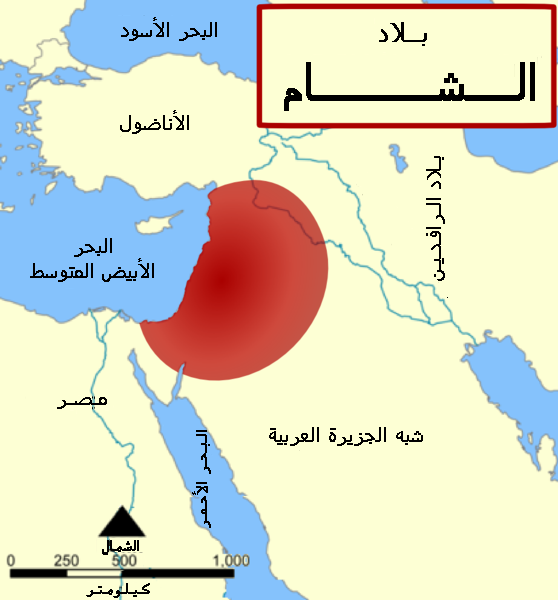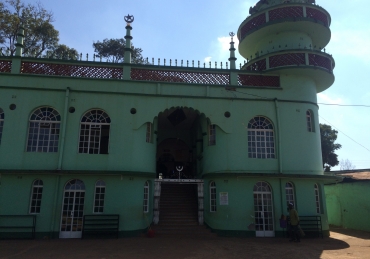Ḥadīth query: Wings of angels spread over Shām
Question
It is mentioned in a ḥadīth that the angels have their wings laid over Shām. How is this reconciled with what is currently happening in Syria? What does this ḥadīth mean? This is creating some confusion. Please clarify.
بسم الله الرحمن الرحیم
Answer
Zayd ibn Thābit al-Anṣārī (d. 45/665-6) (may Allah be pleased with him) narrates, as transmitted in a ṣaḥīḥ (sound) ḥadīth, that the Prophet ﷺ said:
طوبى للشام فقلنا لأي ذلك يا رسول الله قال لأن ملائكة الرحمن باسطة أجنحتها عليها
“Glad tidings for Shām.” So we said, “what is the reason for this O messenger of Allah?” He said, “Because the Angels of The Merciful have spread their wings upon Shām.” (Sunan al-Tirmidhī, 3954; Muṣannaf Ibn Abī Shaybah, 19448; 32466; Musnad Aḥmad, 21606; Ṣaḥīḥ Ibn Ḥibbān, 7304; al-Muʿjam al-Kabīr, 4933; al-Mustadrak, 2900).
It is worth noting several points:
Firstly, Shām does not only refer to modern day Syria. It includes Syria, Palestine, Jordan, Lebanon and parts of Turkey, Iraq and Egypt. In this context, the blessed region has faced turmoil for over one hundred years.
Secondly, this ḥadīth does not mean that trials and tribulations cannot occur in Shām. Indeed, they can occur and historically they have occurred from the Prophetic era until now. The invasion of the region by the crusades and the ongoing Israeli occupation are examples of this.
Thirdly, what does the spreading of the wings refer to? Mullā ʿAlī al-Qārī (d. 1014/1605) explains that the angels have spread their wings over the region of Shām and its people for protection from disbelief.[1] Thus, the fact that the people of Shām are currently fighting against oppression and the Alawites actually affirms this. This meaning is also explained in ṣaḥīḥ (sound) ḥadīths which suggest that at the time of tribulations Īmān (faith) will be in Shām (Musnad Aḥmad, 21733; Musnad al-Bazzār, 4111; al-Muʿjam al-Kabīr, 7714; al-Mustadrak, 8554). Thus, the spreading of the wings refers to protection of Īmān. Perhaps, one can contrast this region with certain regions like Spain and other places which do not share the same virtue and where Islam has been more or less obliterated.
Fourthly, ʿAllāmah Munāwī (d. 1031/1622) extends the meaning of spreading the wings to include blessings and protection from calamity and harm more generally.[2]
My respected father Mufti Shabbīr Aḥmad (b. 1376/1957 – ) was once asked regarding this ḥadīth. He explained that باعتبار المجموع (overall) this region is protected from harm and disbelief. This does not mean that a trial cannot occur at all or that the people can never be harmed. Thus, whenever a trial occurs, eventually justice and the truth will prevail, as affirmed by our history, for example the liberation of al-Quds and the surrounding region at the hands of Ṣalāḥ al-Dīn al-Ayyūbī (d. 589/1193), and as evidenced by some ḥadīths which suggest that the place of abode for Muslims before the end of time will be Shām (Musnad Aḥmad, 5562; 6871; 6952 Sunan Abī Dāwūd, 2482; al-Mustadrak, 8497; 8558). Thus, unlike other areas such as Spain, Bukhara and Samarqand, there is a guarantee that Shām will not suffer from perpetual harm and will generally remain in Muslim hands.
Fifthly, my respected teacher Mufti Ṭāhir Wādī (b. 1376 / 1957 – ) adds that perhaps the spreading of the wings refers to protection from divine punishments. This is perhaps linked to the meaning suggested by Mullā ʿAlī al-Qārī (d. 1014/1605) because a weak ḥadīth transmitted in al-Muʿjam al-Kabīr (746) states, “When the adhān (call to prayer) is made in a town, Allah protects it from his punishment that day.”
Sixthly, Shaykh ʿAbd al-Ḥaq Muḥaddith Dehlawī (d. 1052/1642) suggests that the spreading of the wings refers to the mercy of Allah and His compassion on the people of Shām.[3] This does not preclude the occurrence of trials and tribulations.
Finally, it is also possible that the spreading of the wings refers to the blessings of the region, a fact mentioned in the Qurʾān (17: 1) and many ḥadīths (Ṣaḥīḥ al-Bukhārī, 1037). Many Prophets and companions lived in this region and are buried here, and the region is the place for major prophesised events towards the end of time. Despite the current turmoil, the Barakah (blessing) of the region is clearly visible and experienced by people. Again, the blessed nature of the region does not preclude the occurrence of trials and tribulations.
Therefore, there is no contradiction between the ḥadīth and the current situation. In addition, as serious as the situation currently is, we should not be despondent as it is our belief that the situation will eventually change and we have a role to play in this. We pray to Almighty Allah to unite the Ummah and eliminate tyranny and oppression.
Allah knows best
Yusuf Shabbir
29 Rabīʿ al-Thānī 1427 / 27 January 2017
Footnotes
[1] قال علي القاري في المرقاة (۹: ٤۰۳۹): باسطة أجنحتها علیها أي علی بقعة الشام وأهلها بالمحافظة عن الكفر.
[2] قال المناوي في فیض القدیر (٤: ۲۷٤): لأن ملائكة البلیغ الرحمة الذي وسعت رحمته كل شيء تحفها وتحوطها بإنزال البركات ودفع المهالك والمؤذیات.
[3] قال عبد الحق المحدث الدهلوي في لمعات التنقیح (۹: ۸۱٤): وإضافة الملائكة إلی الرحمن إشارة إلی شمول الرحمة والرأفة علی أهل الشام، ولعل المراد بهم الأبدال الذین یكونون بالشام أو یعم الكل.







Who are the leaders of the youth in Paradise: Abu Sufyan or Hasan and Husayn